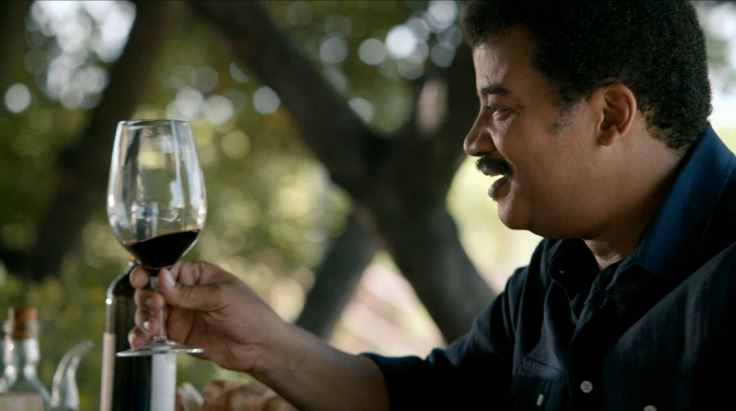One of the great science minds of our time, and almost certainly the finest science communicator of our time, is a wine lover. Neil deGrasse Tyson has a well documented love of wine; apparently when he’s not working on unlocking the secrets of the cosmos, he’s trying to understand the secrets of Gouges, the enigmatic grand cru wines of the Nuits-Saint-George region of Burgundy. (Better stick with the cosmos.)
This is not pertinent to much of anything, beyond simply being an enjoyable fact for those who love wine and science. Tyson is on the Lunch List, my wife often says; she’s referring to the short list of people with whom we’d love to break bread and open a bottle of wine. Where do you begin the conversation with Tyson in that circumstance? You almost wish you didn’t know he was a wine lover. You could waste so much time with that alone.
I resisted the urge to talk wine with Tyson when he joined my talk show two weeks ago. I had a fast-disappearing 30 minutes. But reflecting on his remarks later, my mind drifted back to wine.

Tyson is the host of Cosmos, the reboot of Carl Sagan’s classic series designed to invigorate the American interest in our stars. Here’s what he said about the critics of his show (often from the religious community):
We’re presenting science. I’m not going to tiptoe around how you think or feel, if what you think or feel conflicts with objectively true observations and measurements of the universe in which we live. If you receive science politically, culturally, or religiously, that’s not the fault of Cosmos. You have issues with the universe.
What does this have to do with wine? Well, when facts conflict with beliefs, re-examine your beliefs, no matter the subject. I thought about some of the beliefs about wine that we clutch doggedly, in spite of the evidence. In that spirit, here are five wine facts that might conflict with our beliefs.
1. Weight and mass do not always equal power.
Former Wine Enthusiast writer Steve Heimoff often tried to equate weight with power. He’s hardly alone, of course, but this paragraph from Heimoff nicely illustrates the mistake critics are prone to making:
The main thing I look for in a wine is power. There are synonyms for power: concentration, intensity, volume, size, mass. (These are all nouns; their corresonding adjectives would be words like intense, massive, powerful, huge, etc.). The more mass a wine has, the more likely I am to give it a high score.
Mass does not necessarily mean intensity or power. Weight can be a burden. Imagine a trim, nimble kickboxer. Now imagine an obese, lazy person who can barely get off the couch. Which is more intense, more powerful? Do you want the wine that is a kickboxer, or do you want the lazy guy?
In that piece, Heimoff tried to hedge a bit, but to no avail. His bungling of the very definition of mass was his downfall. In science, there is a relationship between mass and power, but they are not the same thing. When critics pretend they are, it should be no wonder we see winemakers striving to eliminate acidity in the name of compote-like glop.
2. Wine scores are subjective, highly variable, and impermanent.
This one is meant for the retailers who love to tell customers that “this is a 95-point wine,” as if that score is etched into the wine just as factually as the grape varieties.
3. It’s not a 100-point scale if there’s a baseline.
Again, this just a fact. If the scale starts at 50, it’s a 50-point scale. James Suckling’s scale starts at 90, so his is a 10-point scale. (That’s not a jab; he is only interested with 90-point wines.) Most 100-point scales are truncated; John Gilman is the exception, as he proved with his 47-point lampooning of 2010 Pavie.
4. No one is a perfect blind taster.
The best tend to be our most consistent critics, as well as the MW candidates who have to pass rigorous examination. This doesn’t mean that some of us are more adept at discerning wine in a blind setting. It can be great fun. The danger is that people who fall in love with wine inevitably find themselves in a blind tasting, and it can be humbling. We ought not allow them to head home in shame or an illusion that they lack what the rest of the wine-loving world has.
5. Natural wines are not natural.
This has been covered before, but it’s ideally suited to Tyson’s comments about belief versus facts. And the fact is, let a grape hang without intervening and you’re not getting Jamet Côte-Rôtie. You’re getting salad dressing. Once we accept that human intervention is necessary in making wine – and it is – we’re just wrangling over the preferences on a sliding scale.
One of the finest wine writers in the world, Keith Levenberg, wrote the best defense of the term I’ve yet read. His point is that it’s a term that is quickly and easily understood. He might be right, but other terms could be understood as well, and I think he’s ignoring the faith-based fervor that the term “natural” instills. So let’s get back to our Tyson roots here: wine is not natural; that’s just a fact.
And isn’t it easier to stick with facts, and go from there? Tyson was talking about science, but he was talking about life. We’re all better off when we put facts and evidence first, then construct our beliefs around them. Some things we know; others we don’t, and we’re open to finding the answers. When will Gouges open up? I suspect we’ll first find an Earth-like planet with sustainable life. I’ll keep trying Gouges, but I won’t call it natural, and I won’t apologize if I fail to identify it in a blind tasting.
